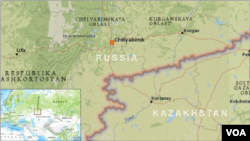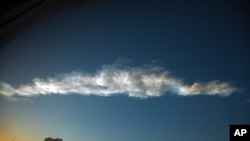MOSCOW —
Russian officials say a meteor hit in the Chelyabinsk region, near the country’s Ural Mountains, setting off blasts that injured more than 750 people, mainly by broken glass.
Witnesses describe objects that look like burning rocks racing across the sky for hundreds of kilometers, leaving a long, white vapor trail in their wake. The sonic boom and shock that followed early Friday shattered windows and set off car alarms.
Russia’s Emergencies Ministry said the meteor exploded over the sparsely populated region east of the Ural Mountains.
Hundreds of people ended up in the hospital for minor injuries due to flying debris, mostly glass.
"The wounds that people have received are mainly from windows and window frames breaking and flying around," said Vladimir Basmanikov, a surgeon at Hospital Number One in Chelyabinsk. He says his hospital had treated 60 or 70 people but that many more needed to be treated.
No fatalities were reported, but at least four people are listed in critical condition.
Amateur video purportedly showing meteor passing over Chelyabinsk region
Damage
Local authorities said a wall and the roof of a Chelyabinsk zinc factory were damaged in the blast. Vladimir Stepanov, a representative for Russia's emergency response service, said emergency teams were already in the area.
"All emergency forces and facilities were switched to high readiness mode," Stepanov said. "That's over 20,000 people, who started an investigation of the territory, to review the situation. As of 10:30 (0430 GMT), as a result of the study, it was revealed that background radiation in the territory was normal. The systems and structures in energy, communications, transport and life maintenance sectors are functioning."
Rare occurence
[The planetary science director at the U.S. space agency, NASA, says the huge meteor was an "exception."
Russian President Vladimir Putin, who is due to host Finance Ministry officials from the Group of 20 nations in Moscow, was immediately informed of the incident in Chelyabinsk, as was Prime Minister Dmitry Medvedev.
The Associated Press quoted the Russian Academy Sciences as saying the meteor entered the Earth's atmosphere at a hypersonic speed of at least 54,000 kph and broke into pieces about 30 to 50 kilometers above the ground.
Intercept technology
Russia's Interfax news agency reported that Deputy Prime Minister Dmitry Rogozin said Friday's meteor strike showed the need for leading world powers to develop a system to intercept objects falling from space. "At the moment, neither we nor the Americans have such technologies," Rogozin told Interfax.
The meteor hit just hours before an asteroid known as 2012 DA14 is set to have a close encounter with Earth. The U.S. space agency NASA says the 45-meter-wide asteroid could come as close as 27,000 kilometers above Earth. The agency insists, however, the asteroid is not in danger of crashing to Earth.
The European Space Agency in its Twitter feed says the meteor above Russia Friday has no connection with the asteroid.
Photo Gallery
Differences Between Space Objects
Differences Between Space Objects- Asteroid: A relatively small, inactive, rocky object orbiting the Sun
- Comet: A relatively small object whose ice can vaporize in sunlight to create an atmosphere of dust and gas, and sometimes form a tail
- Meteor: A piece of space rock -- often from an asteroid or comet -- that enters the Earth's atmosphere. Many burn up due to the friction and heat
- Meteorite: A meteor that survives its journey through the Earth's atmosphere and strikes the Earth's surface
Russia’s Emergencies Ministry said the meteor exploded over the sparsely populated region east of the Ural Mountains.
Hundreds of people ended up in the hospital for minor injuries due to flying debris, mostly glass.
"The wounds that people have received are mainly from windows and window frames breaking and flying around," said Vladimir Basmanikov, a surgeon at Hospital Number One in Chelyabinsk. He says his hospital had treated 60 or 70 people but that many more needed to be treated.
No fatalities were reported, but at least four people are listed in critical condition.
Amateur video purportedly showing meteor passing over Chelyabinsk region
Damage
Local authorities said a wall and the roof of a Chelyabinsk zinc factory were damaged in the blast. Vladimir Stepanov, a representative for Russia's emergency response service, said emergency teams were already in the area.
"All emergency forces and facilities were switched to high readiness mode," Stepanov said. "That's over 20,000 people, who started an investigation of the territory, to review the situation. As of 10:30 (0430 GMT), as a result of the study, it was revealed that background radiation in the territory was normal. The systems and structures in energy, communications, transport and life maintenance sectors are functioning."
Rare occurence
[The planetary science director at the U.S. space agency, NASA, says the huge meteor was an "exception."
Jim Green says "fireballs" of this kind happen on a daily basis, but most of them are not seen because they fall over the ocean or in remote areas.]
Russian President Vladimir Putin, who is due to host Finance Ministry officials from the Group of 20 nations in Moscow, was immediately informed of the incident in Chelyabinsk, as was Prime Minister Dmitry Medvedev.
The Associated Press quoted the Russian Academy Sciences as saying the meteor entered the Earth's atmosphere at a hypersonic speed of at least 54,000 kph and broke into pieces about 30 to 50 kilometers above the ground.
Intercept technology
Russia's Interfax news agency reported that Deputy Prime Minister Dmitry Rogozin said Friday's meteor strike showed the need for leading world powers to develop a system to intercept objects falling from space. "At the moment, neither we nor the Americans have such technologies," Rogozin told Interfax.
The meteor hit just hours before an asteroid known as 2012 DA14 is set to have a close encounter with Earth. The U.S. space agency NASA says the 45-meter-wide asteroid could come as close as 27,000 kilometers above Earth. The agency insists, however, the asteroid is not in danger of crashing to Earth.
The European Space Agency in its Twitter feed says the meteor above Russia Friday has no connection with the asteroid.
RT @esaoperations: ESA experts confirm *no* link between #meteor incidents in #Russia & #Asteroid #2012DA14 Earth flyby of tonight #SSA #NEO
— ESA Science (@esascience) February 15, 2013
Photo Gallery





